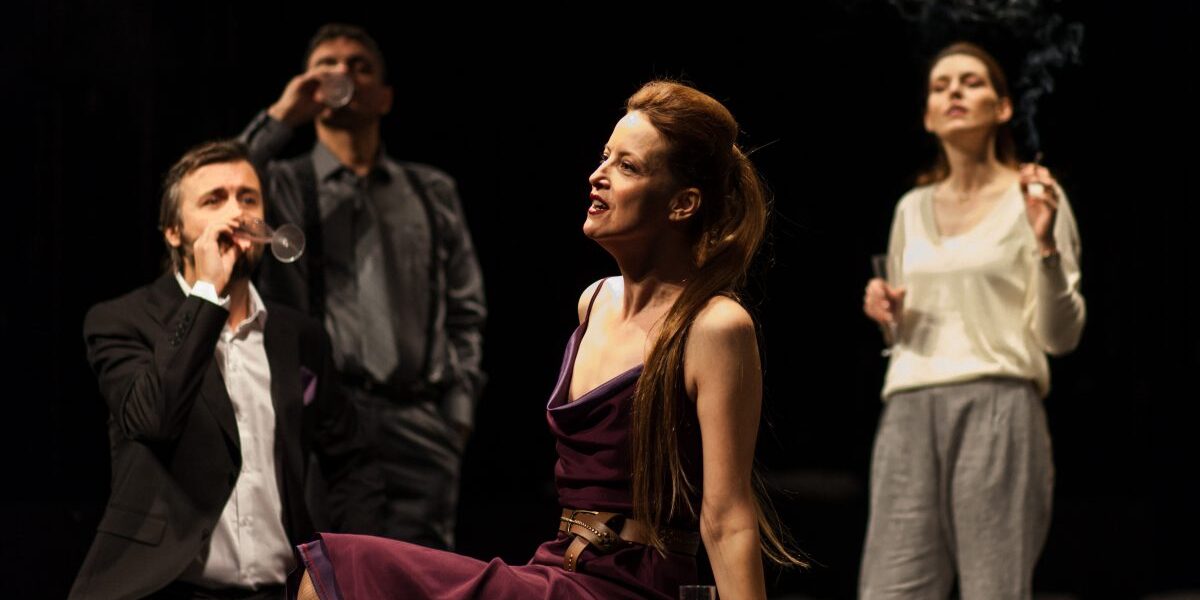Photo: Boško Đorđević
Atelje 212, Belgrade, premiered on 18th November, 2021
There’s no better time to stage Nina Raine’s play, Consent, than right now – at the flashpoint of the Serbian MeToo movement. Numerous artists have recently withdrawn their work from the Susreti festival in Brcko due to the involvement of actor Branislav Lecic because of the accusation of rape made against him by the actress Daniela Steinfeld.
Part of the repertoire of Atelje 212, this is a play where the subject of rape is treated carefully and viewed from all sides: from the victim’s perspective as well as the lawyer’s perspective. It explores all the problems a victim has if she wants to report the abuse. It also tells a story about privileged white males in position of power learning that rape is a real crime, an act of violence and degradation against a human being, and that they’re also part of the system of violence.
Premiering at the National Theatre in London in 2017, Nina Raine’s play is about lawyers, their private marital problems and how these intersect with their opinions on rape. Two married couples, Kitty (Tamara Dragicevic) and Edward (Bojan Zirovic), and Jack (Branislav Trifunovic) and Rachel (Jovana Gavrilovic), try to hook up their friends, the actress Zara (Jelena Stupljanin) with the lawyer Tim (Marko Grabez). The couples go through a series of break-ups and acts of revenge, while two of them also work on the case of the rape of a working class woman. The attitudes they have on rape are aligned with their own behavior. Those who cheat and behave in a narcissistic manner, who act without empathy, are also prone to relativisation and the denial of rape. Once they experience pain, when their female partners cheat on them, they learn empathy.
In the background, we are presented with the story of Gayle, a woman who was raped on the day she buried her little sister. It is a peripheral but crucial part of the play. Sofija Jurican, as Gayle, really performs well the character’s trauma and will to live – her will to fight. She is not the ideal victim of the popular imagination – she is not a 10 year old girl raped by a stranger in a bush – rather a sexually experienced woman who dresses in mesh stockings and was raped by a man she knew well, in her own apartment – but she is still a victim of abuse. Her story is the kind that is almost always thrown away by the court, dismissed as a false accusation, even fetishized. The rape scene is not a part of Raine’s play; instead it is narrated by Gayle, who is constantly interrupted by Edward, who tries to gaslight her and to convince her that she gave consent to her rapist.
This is not the only case of rape in this play. The other one takes place in the bourgeoise sphere, among our protagonists: Kitty is raped by her husband Edward when she tries to leave him for Tim. But this case is on the borderline, because Edward thought that they were having passionate ‘goodbye/don’t leave me sex,’ but Kitty did not give consent, and she repeatedly said “no“.
We also do not see this scene represented on the stage, instead it is narrated by Edward, who is visibly upset by the fact that Kitty later told him that what had happened was rape. There is not any moment where Kitty seems in any way upset about being raped by her husband; it seems more that she’s lying to get the custody of their child, which we can read as a relativisation of rape in a marriage. It sometimes seems that the director, Nebojša Bradić, has a bit too much empathy with the men who relativize violence, than with their wives who are experiencing emotional and, in the end, even physical violence in their marriages. But it’s still better to open up this theme with a well written play than to ignore the problem and never start a conversation about it, or worse.
After Edward tells his friends that Kitty told them that he raped her, Jack sides with Kitty, and Rachel sides with Edward, because she empathises with his desire to get revenge after being cheated on. She says: “sadism is empathy reversed.“ And there we get the point of the play and of the problem – in places where the ego is more important than empathy with others, we find justification of rape. The government and legal system enable it, just as they do with the character of Gayle, who, at the climax of the play, pays an unexpected visit to Edward’s house. She goes out of her mind when she realizes that the barrister is living his comfortable life and casually consuming alcohol and weed, that he doesn’t have any empathy for the struggle of a working class woman that was raped and severely traumatized.
The play states that this is not a society where you can get justice through the courts, but only by revenge, like Medea, with the help of the Greek goddess of revenge – Nemesis. Eventually, Edward and Kitty make peace and forgive each other, which has a cathartic effect. But Gayle still stands before the audience, in the rain, waiting for a car to give her a ride, a reference to the night when she was raped for the first time with her sister, while hitchhiking by the road. Her request for justice goes unanswered.
The dominant acting style is realism, which is logical as this is a classical, almost Ibsen-like salon play. The scenography (by Marija Jevtic) is minimal. We’re clearly in a courtroom, even when we’re in living rooms and at cocktail parties. Part of the audience is seated on the stage, as the jury. But the costumes of the lawyers (by Marina Medenica) are so luxurious and elegant that they make them look untouchable, even dehumanized. The text doesn’t necessarily imply that these lawyers have to be high class even when brushing their teeth, which begs the question how can we ever get rid of the chains of class-based society if we don’t free ourselves from them in the theatre?
The most important thing this production achieves is to deliver this message to a Serbian audience today and stage it with compassion, while maintaining its social critique. In spite of everything, this play is full of humour, though is packed into a serious, engaged and cathartic piece.
Hopefully, the Serbian theatre industry will take note and we, as a society, will stop justifying and ignoring violence and gaslighting everyone who speaks their truth, if it collides with their worldview.
Credits:
Author: Nina Raine
Director: Nebojše Bradića
Cast: Bojan Žirović, Tamara Dragičević, Marko Grabež, Branislav Trifunović, Jovana Gavrilović, Jelena Stupljanin i Sofija Juričan.
Scenography: Marija Jevtić,
Costume: Marina Medenica,
Composer; Zoran Erić.
Mina Milošević is a playwright, dramaturg, screenwriter, and theoretician based in Belgrade. She holds a BA in Dramaturgy and an MA in Theory of Drama Arts at the Faculty of Dramatic Arts in Belgrade. She worked as a dramaturg on plays in Atelje 212, Belgrade Drama Theatre, Yugoslav Drama Theatre, National Theatre in Belgrade, and Oda Theatre in Prishtina. Her play "Dr Ausländer (Made for Germany)" was presented at BITEF festival 2022. Her master's thesis on female friendship in Serbian contemporary theatre won the "Professor Boško Milin" Award.








